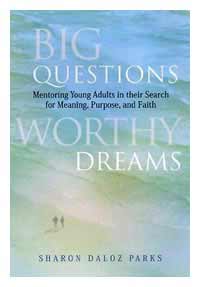Sharon Daloz Parks provides a very useful contribution to the literature on faith development. Her 1986 book, The Critical Years: Young Adults and the Search for Meaning, Faith and Commitment, is now out of print and has been rewritten by Sharon and published as Big Questions, Worthy Dreams: Mentoring Young Adults in Their Search for Meaning, Purpose, and Faith, by Jossey Bass, San Francisco, 2000.
Sharon is an Associate Director at the Whidbey Institute for Earth, Spirit, and the Human Future, and teaches at Seattle University. She’s just published her new book, Leadership Can Be Taught: A Bold Approach for a Complex World.
Introduction
 Parks explains that when invited to rewrite Critical Years she found that with all the changes made she’d written a new book. She cites the changes since 1988: economic changes affecting young adults, extension of life span making the 20s decade more significant, and religious pluralism. She says that it has become even more important to understand faith in its broadest most inclusive form as the activity of making meaning that all human beings share. She explains that the first book was aimed at people involved in higher/tertiary education. She expands that context in the new book, particularly in chapter 9.
Parks explains that when invited to rewrite Critical Years she found that with all the changes made she’d written a new book. She cites the changes since 1988: economic changes affecting young adults, extension of life span making the 20s decade more significant, and religious pluralism. She says that it has become even more important to understand faith in its broadest most inclusive form as the activity of making meaning that all human beings share. She explains that the first book was aimed at people involved in higher/tertiary education. She expands that context in the new book, particularly in chapter 9.
Sharon has worked and researched at Whitworth College, Harvard Divinity School, Harvard Business School, Kennedy School of Government and in a study published as Common Fire : Leading Lives of Commitment in a Complex World.
1. Young Adulthood in a Changing World: Promise and Vulnerability
Sharon helps us think about the threshold into adulthood by asking about the the key marker that defines the task of the young adult era. She writes that the central task is found in the experience of the birth of critical awareness and the dissolution and recomposition of the meaning of self, other, world and ‘God’. Between the ages of 17 to 30 a distinctive mode of meaning making can emerge:
- Becoming critically aware of one’s own composing of reality
- Self-consciously participating in an ongoing dialogue toward truth
- Cultivating a capacity to respond in ways that are satisfying and just.
2. Meaning and Faith
Sharon considers the various ways in which people approach the concept of faith.
Religion – association with a particular practice or dogma. Problematic in a multi-faith community. Spirituality – faith connected with faithfulness – trust, loyalty, connection. A human universal – something everybody develops. Belief. Parks traces the shift of meaning in the words ‘belief’ from holding something dear, to a more impersonal assent to dogma.
Truth and Skepticism. For faith to become mature it must be able to doubt itself.
Sharon goes on to explore faith as a primal force of promise and a centre of power, value and affection. She looks into the realities of everyday polytheism – juggling many gods – and what Niebuhr called ‘henotheism’ – the elevation of a single cause or centre such as career. With Niehbuhr she calls us to radical monotheism as the One embracing the many. Parks explores the realities of suffering and faith, working on the metaphors of shipwreck, gladness and amazement.
3. Becoming at Home in the Universe
Here Parks draws together her learnings from a number of academic theorists. This is best read as a journey of synthesis for Parks, rather than just an academic summary.
Sharon begins with the contributions of Erik Erikson. She considers the ways in which Jean Piaget work is expressed in Robert Fulgham’s essay, “All I ever need to learn I learned at kindergarten”. She looks at the work of Robert Kegan’s theory of self in motion, seeing our human development in relationship to our environment over time. Carol Gilligan’s perspective focuses not on differentiation of subject from object, but on the relation that orients subect to object, self to other, self to truth, self to possibility. James Fowler’s work is explored in relation to faith and psychological development. Bill Perry’s work at Harvard provides the final link in Sharon’s development of an approach to young adult faith formation. Keniston’s work on the development of the ‘twenty something’ stage helped confirm Parks’ hunch that there are two separate identifiable stages in fourth stage of Kegan and Fowler. She writes about a paper written by her then-future husband, Larry Daloz, that helped her realise that our metaphors of growth and development shape our approach to real people.
Parks challenges the fixation we have with the metaphor of journey. She says that perhaps for males the central task in becoming self may be separation or differentiation, going forth and heading out. In contrast, for females, the task of becoming a self requires identification with, attachment, and connection. She thus identifies to great yearnings that can be held within the same person: one of autonomy, the other of relation.
The Rest
The remaining chapters I’ll cover in other posts…
4. It Matters How We Think
5. It all depends…
6. … On Belonging
7. Imagination: The Power of Adult Faith
8. The Gifts of a Mentoring Environment
9. Mentoring Communities
10. Culture as Mentor
